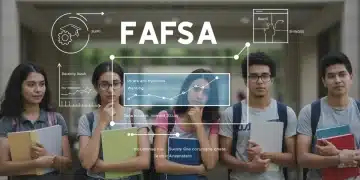American education grants usa: your path to funding success

American education grants provide financial aid that does not need to be repaid, aimed at supporting students in covering tuition and other educational costs based on need and eligibility criteria.
American education grants usa offer students a vital way to fund their college dreams. Have you ever wondered how these grants can impact your financial future?
What are education grants in the USA?
Education grants in the USA provide financial support to students pursuing their educational goals. These grants are a crucial part of funding higher education, allowing students to focus on their studies without the burden of student loans. Let’s explore what these grants are and how they can benefit you.
Understanding Education Grants
Education grants are funds awarded to students that do not need to be repaid. They can come from federal, state, or local governments, as well as private organizations. These grants are typically based on financial need, academic achievement, or other specific criteria.
Types of Education Grants
There are various types of education grants available:
- Pell Grant: A federal grant for low-income undergraduate students.
- Federal Supplemental Educational Opportunity Grant (FSEOG): For students with exceptional financial need.
- State Grants: Offered by individual states to support students attending college in their state.
Education grants can also be awarded based on the field of study, such as grants for specific programs in science, technology, engineering, or math (STEM). This makes them a valuable resource for students pursuing careers in high-demand areas.
Students should regularly check for grant opportunities as deadlines can vary. Filing the Free Application for Federal Student Aid (FAFSA) is often the first step to access many of these grants. By taking this step, students can increase their chances of securing funding for their education.
Types of American education grants
There are several types of American education grants available to students, each designed to help ease the financial burden of education. Understanding these grants is crucial for any student seeking assistance with funding their college expenses.
Federal Grants
One of the most well-known types of grants is the Pell Grant, which is awarded to low-income undergraduate students. This grant helps cover tuition and educational costs, making it easier for many to attend college.
Another significant federal grant is the Federal Supplemental Educational Opportunity Grant (FSEOG). This grant is for students with exceptional financial need, offering additional funds on top of other scholarships and grants received.
State Grants
Each state also offers its own education grants. These grants can vary widely in terms of eligibility and funding amounts. Many states provide grants for residents who attend in-state colleges, which can significantly reduce tuition costs. To find information about state grants, students should check their state’s higher education website.
Institutional Grants
Many colleges and universities offer their own institutional grants. These funds are often based on financial need or academic achievement. Students can inquire about available grants by contacting their financial aid office. Institutional grants can sometimes cover a substantial portion of tuition, making them highly valuable.
- Pell Grant: For low-income undergraduate students.
- FSEOG: Awarded to students with exceptional financial need.
- State Grants: Provided by individual states for residents attending in-state colleges.
- Institutional Grants: Offered by colleges based on need or merit.
In addition to these, there are also specialized grants available for students pursuing certain fields or demographics. Grants for science, technology, engineering, and mathematics (STEM) students are increasingly popular, as are those aimed at underrepresented groups in higher education.
Eligibility requirements for education grants

Understanding the eligibility requirements for education grants is essential for students seeking financial aid. Each grant has its specific criteria, which can vary depending on the type and source of funding.
Basic Eligibility Criteria
Generally, most education grants require students to meet basic criteria. They often include being a U.S. citizen or eligible non-citizen, possessing a valid Social Security number, and demonstrating financial need. Academic standing is also a significant factor, as many grants require a minimum GPA.
Specific Grant Requirements
Pell Grants are primarily awarded to undergraduate students who demonstrate exceptional financial need. To qualify, applicants must complete the FAFSA (Free Application for Federal Student Aid) to determine their financial situation.
State grants may have different requirements, including residency status, which means applicants generally need to be residents of the state providing the grant. Many states also have specific deadlines that must be met to be considered.
Institutional Grants
For institutional grants offered by colleges, eligibility can depend on various factors, including academic performance and the chosen field of study. Students should check with their college’s financial aid office for specific information.
- Residency: Must be a resident of the state for state grants.
- Enrollment Status: Full-time or part-time enrollment may be required.
- Field of Study: Some grants are limited to specific programs.
- Financial Need: Demonstrated through FAFSA or other forms.
Students should pay close attention to these eligibility requirements, as missing a criterion can result in losing the opportunity for funding. It’s advisable to start the application process early and gather all necessary documents.
How to apply for education grants
Applying for education grants can seem overwhelming, but understanding the process can simplify it greatly. Each grant has its own application procedure, but some general steps can guide students through the process.
Step 1: Research Available Grants
The first step in applying for education grants is to research the options that suit your needs. Check federal, state, and local grants, as well as those offered by institutions or private organizations. Take note of eligibility requirements and deadlines.
Step 2: Complete the FAFSA
The Free Application for Federal Student Aid (FAFSA) is essential for many education grants. This form determines your financial needs and eligibility for federal financial aid. Fill out the FAFSA online, making sure to provide accurate information about your financial situation.
- Gather necessary documents: Have your tax returns, bank statements, and other financial records ready.
- Submit on time: Be aware of federal and state deadlines for FAFSA submissions.
- Signature: Sign the FAFSA electronically or print and mail the signature page.
Step 3: Prepare Additional Documentation
Some grants require additional documentation beyond the FAFSA. This may include essays, letters of recommendation, or proof of enrollment. Make sure to follow all instructions closely to provide the required information.
Step 4: Submit Your Applications
After gathering all necessary documents, submit your grant applications. Keep track of each application’s deadlines and submission requirements. Confirm that all applications have been received by the organizations.
It’s also a good idea to follow up with the financial aid offices to ensure your applications are processed. Being proactive can help resolve any issues early on.
Tips for maximizing your grant opportunities
Maximizing your grant opportunities is essential for securing the funding you need for your education. By following a few key strategies, you can increase your chances of receiving financial aid.
Start Early
The first tip for maximizing grant opportunities is to start your search early. Begin researching available grants at least six months before you plan to apply. This gives you ample time to explore all your options and meet required deadlines.
Be Organized
Keeping track of different grants and their requirements can be overwhelming. Create a spreadsheet or document to manage details such as:
- Grant name: The title of the grant.
- Eligibility criteria: Basic qualifications needed.
- Deadlines: Important submission dates.
- Documents required: Any supplementary paperwork needed.
Tailor Your Applications
Each application should be customized to the specific grant. Take the time to highlight how you meet the requirements and discuss your goals. Including personal stories or experiences can make your application stand out.
Seek Help
Don’t hesitate to ask for assistance. Reach out to school counselors, financial aid advisors, or even peers who have successfully secured grants. They can provide valuable insights and guidance in the application process.
Follow Up
After submitting your applications, it’s important to follow up. Ensure that all documents were received, and check in on the status of your application. Being proactive shows that you are committed and organized.
Applying for education grants can open doors to opportunities you never thought possible. By understanding the types of grants available, meeting eligibility requirements, and following the application process carefully, you can significantly increase your chances of securing financial aid. Remember, being organized, starting early, and seeking help when needed are key strategies. Maximize your chances by tailoring each application to its specific grant and always following up. With determination and the right approach, the funding you need for your education is within reach!
FAQ – Frequently Asked Questions about Education Grants
What are education grants?
Education grants are funds given to students that do not need to be repaid, helping to cover tuition and other educational costs.
How do I apply for education grants?
To apply for education grants, research available options, complete the FAFSA, and submit any required documents for each grant.
What are the eligibility requirements for education grants?
Eligibility varies by grant but generally requires being a U.S. citizen, showing financial need, and maintaining satisfactory academic performance.
How can I maximize my chances of receiving a grant?
You can maximize your chances by starting your search early, staying organized, tailoring each application to specific grants, and following up with the grant providers.





